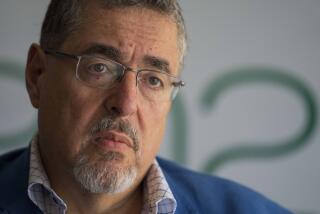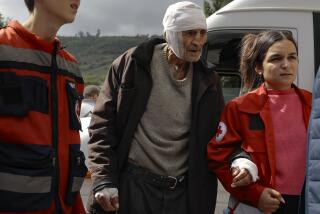3 Prosecutors Fired Over Armenia Roles : 4 Others Assailed for Failing to Prevent Murders in Ethnic Clashes
- Share via
MOSCOW — Three state prosecutors in Soviet Armenia have been fired for failing to prevent the spread of ethnic unrest in the troubled republic last month, the Communist Party newspaper Pravda said Friday.
In addition, four other prosecutors were severely reprimanded and another was told that he would not be reappointed when his term of office expires.
The prosecutors all worked in districts that were the scene of clashes between Armenians, who are predominantly Christian, and minority Azerbaijanis, who are mostly Muslim. About 20 people were killed in the violence in December alone.
The ethnic troubles are centered on Nagorno-Karabakh, a mostly Armenian region which is under the administrative rule of the republic of Azerbaijan. Armenians have been campaigning for a year for the area to be transferred to control of the Armenian republic, but Soviet authorities have rejected the demand.
Pravda said the prosecutors had failed to prevent the murder of innocent individuals, and accused one of the officials of making “concessions” to the Karabakh committee, which has led the Armenian opposition. Tens of thousands of refugees have fled the area because of the violence. Soviet officials have accused local Armenian leaders of looking the other way or encouraging violence against Azerbaijanis.
Writing in Komsomoloskaya Pravda, the Soviet youth newspaper, one of the country’s most conservative journalists Friday complained that “parallel echelons of power” had arisen in Armenia in the wake of the violence and the devastating earthquake that killed an estimated tens of thousands last month.
“Government services don’t just fail to function,” wrote Elena Losoto. “They refuse to accept responsibility for their actions.”
She said most services only pretend to exist and she suggested that neighboring Georgia was quicker to respond to the Armenian earthquake than were Armenian officials.
The rise of so-called “parallel structures,” an apparent reference to the Karabakh committee and the like, will never be stopped entirely, Losoto wrote. She recommended the “re-creation” of the party and government apparatus in the republic and said that until then, the burden will have to be shouldered by Armenia’s “Russian brother.”
No Warm Clothing
The newspaper Socialist Industry also criticized the Armenian authorities for failing to distribute accumulated aid in the aftermath of the earthquake.
“To this day, many people, adults and children alike, are without warm outer clothing or shoes,” the newspaper said. “But sack loads are piled up in every Yerevan (the capital) warehouse and in rail cars standing at railway sidings.”
Many of the survivors of the quake had escaped harm by dashing outdoors without dressing against the cold and have been left to live in tents without overcoats and warm shoes.
The newspaper said $3.8 million was needed to provide clothing and shoes for the victims and complained that money collected in a special bank account for the victims was lying unused.
“Surely the voluntary contributions by the thousands and thousands of organizations and citizens of our country can be used to provide the most urgent needs of the countless victims of the quake,” the newspaper said.
Meanwhile, according to the news agency Reuters, the Red Army newspaper criticized the growth of independent political groups in Moldavia amid signs that a revival of nationalist sentiment among minorities has spread to the Soviet republic.
Red Star, in the first detailed account to appear in the central Soviet press, described how groups in the republic were setting up cells in workplaces and rejecting contacts with the ruling Communist Party.
“One cannot help noting that activists have continuing contacts with emissaries arriving from similar movements in the Baltic republics and regularly exchange with them the experience of their work,” the newspaper said.
Moldavia--like the Baltic republics, Estonia, Lithuania and Latvia--was incorporated into the Soviet Union as a result of secret clauses in the 1939 Nazi-Soviet pact.
The criticism follows signs of a revival of nationalist feelings among ethnic Moldavians, who make up about two-thirds of the population of the 4.2 million-strong republic, which was created in 1940 largely out of Romanian territory.
In a clear parallel with developments last year in the Baltic republics, demands have been concentrated on national culture and language which have been suppressed under Soviet rule.
More to Read
Sign up for Essential California
The most important California stories and recommendations in your inbox every morning.
You may occasionally receive promotional content from the Los Angeles Times.













